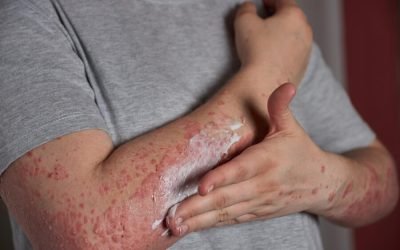Drug Allergy Rash Treatment by Dr. Parwaaz Matharoo

book your appointment

Understanding Drug Allergies
Symptoms of Drug Allergy Rash

A drug allergy rash is one of the most common manifestations of drug allergies. Symptoms may include:
- Red, Itchy Skin: Redness and itching are often the first signs of a drug-induced allergic reaction.
- Hives or Welts: Raised, red, itchy bumps on the skin, often with a pale center.
- Swelling: Swelling of the face, lips, tongue, or throat can accompany a rash.
- Blisters or Peeling Skin: Severe reactions may cause blisters or peeling, resembling a burn.
- Fever: A fever may accompany more severe reactions, indicating a systemic response
Types of Drug Allergy Rashes
Drug allergy rashes can manifest in various forms, including:
- Maculopapular Rash: Flat or raised red spots that may join together.
- Urticaria (Hives): Raised, red, itchy welts on the skin.
- Angioedema: Deep swelling beneath the skin, often around the eyes and lips.
- Fixed Drug Eruption: Red or purple patches that reappear in the same place each time the drug is taken.
- Stevens-Johnson Syndrome (SJS): A severe reaction causing blistering and peeling of the skin.
Common Causes of Drug Allergies
Several medications can trigger allergic reactions, including:
- Antibiotics (e.g., Penicillin): One of the most common causes of drug allergies.
- Nonsteroidal Anti-Inflammatory Drugs (NSAIDs): Medications like ibuprofen and aspirin.
- Anticonvulsants: Drugs used to treat seizures.
- Chemotherapy Drugs: Medications used in cancer treatment.
- Sulfa Drugs: Commonly used antibiotics that can cause severe reactions in some individuals.
- Barbiturates: Used for sedation and anesthesia.
Risk Factors for Drug Allergies
Certain factors can increase the likelihood of developing a drug allergy, including:
- Genetic Predisposition: A family history of drug allergies can increase your risk.
- Previous Allergic Reactions: If you’ve had allergic reactions to other medications or substances.
- Chronic Health Conditions: Conditions like HIV or Epstein-Barr virus can increase susceptibility.
- Frequent Drug Exposure: Repeated or long-term use of a drug can lead to sensitization and allergy development.
Diagnosing Drug Allergies

Dr. Parwaaz Matharoo employs a comprehensive approach to diagnose drug allergies, including:
- Detailed Medical History: Understanding your medication history and previous allergic reactions.
- Physical Examination: Assessing the type and severity of the rash and determining the best Drug Allergy Rash Treatment.
- Allergy Testing:
- Skin Tests: Small amounts of the suspected drug are applied to the skin or injected just under the skin to see if a reaction occurs.
- Blood Tests: These can measure the immune system’s response to certain drugs.
- Drug Challenge Testing: Administering the suspected drug in a controlled setting to observe any allergic reactions.
Effective Drug Allergy Rash Treatments
Treatment for drug allergy rash involves several strategies:
- Discontinuing the Drug: Stopping the medication causing the allergy is the first step.
- Medications:
- Antihistamines: To reduce itching and swelling. Examples include diphenhydramine and cetirizine.
- Corticosteroids: To decrease inflammation and help with severe reactions. These can be taken orally, applied topically, or injected.
- Epinephrine: For severe reactions (anaphylaxis). This is usually administered as an injection and is a critical emergency treatment.
- Supportive Care:
- Hydration and Rest: Ensuring the patient stays hydrated and gets plenty of rest to help the body recover.
- Cool Compresses: Applying cool compresses to the affected areas can soothe the skin and reduce itching and inflammation.
- Avoidance of Triggers: Identifying and avoiding the medication that caused the allergic reaction is crucial for preventing future occurrences.
Long-Term Management of Drug Allergies

For individuals with drug allergies, Drug Allergy Rash Treatment and long-term management strategies are essential to avoid future reactions. These include:
- Medical Alert Identification: Wearing a medical alert bracelet that lists known drug allergies.
- Detailed Medical Records: Keeping an updated record of all known allergies and sharing this information with all healthcare providers.
- Alternative Medications: Working with your doctor to find alternative medications that do not trigger an allergic reaction.
- Education and Awareness: Understanding the signs and symptoms of drug allergies and knowing when to seek medical help.
Preventing Drug Allergies
Preventing drug allergies involves:
- Avoidance: Avoiding known allergens by carefully reading medication labels and communicating with healthcare providers.
- Medical Alert Identification: Wearing a medical alert bracelet that lists known drug allergies.
- Communication: Informing healthcare providers, including pharmacists and dentists, about your allergies to avoid exposure to the offending drug.
- Careful Medication Management: Ensuring that all medications are taken exactly as prescribed and under the supervision of a healthcare provider.
- Gradual Introduction of New Medications: Introducing new medications gradually, especially if there is a history of allergies, to monitor for any adverse reactions.
Why Choose Dr. Parwaaz Matharoo for Drug Allergy Treatments?
- Expertise and Experience: With years of experience in dermatology, Dr. Matharoo has successfully treated numerous patients with drug allergies.
- Patient-Centered Approach: Focuses on comprehensive care, ensuring patients are well-informed about their condition and treatment options.
- Advanced Diagnostic Techniques: Utilizes the latest diagnostic tools and methods to accurately identify drug allergies.
- Holistic Treatment Plans: Offers tailored treatment plans that address both the symptoms and the root cause of the allergy.
- Ongoing Support and Follow-up: Ensures continuous care and monitoring to prevent future allergic reactions and manage existing conditions effectively.
Holistic and Integrative Approaches
Dr. Matharoo believes in a holistic approach to treating drug allergies, integrating traditional medical treatments with complementary therapies to enhance patient outcomes. Some integrative approaches include:
- Nutritional Support: Ensuring a balanced diet to support overall health and the immune system.
- Stress Management: Techniques like yoga, meditation, and counseling to reduce stress, which can exacerbate allergic reactions.
- Herbal Supplements: Under medical supervision, certain herbal supplements may help in managing allergic symptoms and boosting immunity.
Additional Resources
For more information on drug allergies and their management, consider the following resources:
- American Academy of Allergy, Asthma & Immunology (AAAAI): Provides extensive information on drug allergies, including symptoms, treatment options, and research updates.
- National Institutes of Health (NIH): Offers detailed articles and studies on drug allergies and their impact on health.
- World Allergy Organization (WAO): A global resource for allergy information, including guidelines for diagnosis and treatment.

Frequently Asked Questions (FAQs)
A drug allergy involves an immune system response and can be severe, while a drug side effect is an expected, non-immune system-related response to a medication.
Drug allergies can develop within minutes to hours after taking the medication, but some reactions may take several days to appear.
While drug allergies cannot be cured, they can be effectively managed and prevented with appropriate treatment and avoidance strategies.
Over-the-counter antihistamines can help manage mild symptoms, but it’s essential to consult a healthcare provider for a comprehensive treatment plan.
Seek immediate medical attention if you experience symptoms of a severe allergic reaction, such as difficulty breathing, swelling of the face or throat, or a rapid, weak pulse.
Book an Appointment
If you suspect you have a drug allergy, don’t wait. Drug Allergy Rash Treatment is essential for managing your symptoms and preventing complications. Book an appointment with Dr. Parwaaz Matharoo today for expert diagnosis and effective treatment. Visit The House of Skin to learn more and schedule your consultation.
Contact Information
For further inquiries or to schedule an appointment, please contact Dr. Parwaaz Matharoo at The House of Skin. Our team is dedicated to providing you with the highest level of care and support in managing your drug allergy.
Get Consultation With Our Experts
Schedule a consultation today and embark on a journey towards informed decision-making and success. Your challenges, our expertise – let’s collaborate for a brighter future.

